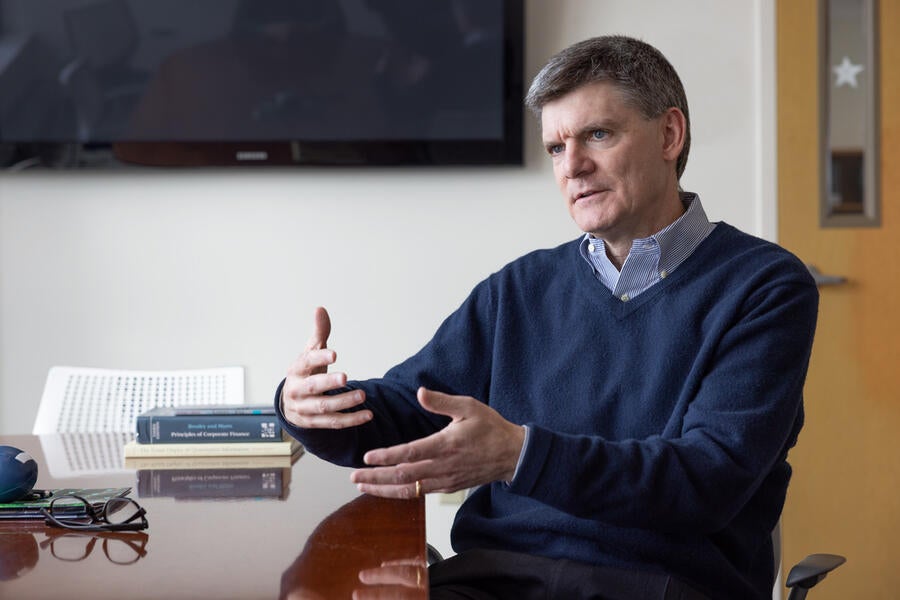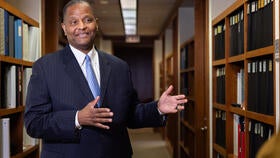
Stephen C. Murphy is vice president for finance and chief financial officer of the university. Part of his charge is to lead the OneFinance Initiative, which is a core pillar of Yale’s Operations Strategy. YourYale recently spoke with Murphy about streamlining financial services and building culture.
The conversation has been edited and condensed.
Can you take a moment to talk about the work of Finance at Yale and how it fits within the Operations Strategy?
One of the core pillars of the Operations Strategy is “Resourcing the Mission.” Resourcing the mission is exactly what the Finance function is all about. Money is a bit like the electricity running through the wires in each of Yale’s buildings. Without money, the lights and computers go off, and there aren’t faculty, students, or staff to carry out the mission. Financial professionals help make every aspect of the mission happen, every day.
That includes functions like payroll, procurement, budgeting, and planning, and ensuring that Yale has the systems, tools, and training to make those things happen. Finance at a university also means managing things like endowments, gifts, grants, medical services, tuition, and financial aid.
Can you highlight the progress that has been made for the OneFinance Initiative?
I’m really excited about the OneFinance Strategic Initiative and the progress we’re making. There’s so much to celebrate, but I want to highlight the progress the team has made on building out three important capabilities.
We’ve created a central monitoring team and tools to help identify potential fraud, compliance, or quality issues. We’ll be building this out more, too, like getting dashboards in the hands of departments.
We’ve also built and deployed over two dozen on-demand financial training courses that are now available through the new Workday Learning tool. This includes everything from an updated onboarding curriculum for all new financial staff to an overview of Yale’s Finance function to fraud awareness and prevention. We’ve also got a neat new course on how to create an expense report, a topic that many schools and units said was at the top of their list, and more courses are coming.
The third area is culture. As any CFO will tell you, a culture of stewardship and internal controls begins and ends with a strong “tone at the top” and gives us a firm foundation on which we can continue building. I’m really pleased the president, provost, deans, and vice presidents publicly reaffirmed their commitment to a culture of integrity and ethical conduct. I’m also happy that the Institutional Standards of Conduct are updated and have been shared with faculty and staff. These were not OneFinance-specific initiatives, but we were very involved, and it’s a great example of how “everyone has a role in creating a culture of stewardship.”
What are your values and how have they guided your own career?
Recently my senior team and I adopted three values that we actively try to live by in our leadership roles: We care. We lead by example. We have the courage to get better.
That first one (we care) is particularly meaningful to me. I learned that one a bit late—just in the last few years. It was painful, and I’m grateful that some people spoke up—like an anvil dropping on my head. No pain, no gain, I guess. Fortunately, it helped me understand the important role of a leader in shaping the work environment. In the words of an advisor and friend of mine, “culture is either an asset or a liability,” and it’s the leader’s special responsibility to create a positive work environment that will bring out the best in others. It sounds obvious and easy. It is obvious, but it’s the hardest and most important work a leader needs to do every day. Creating a positive work environment has been my top priority ever since.
Is the OneFinance Initiative your focus for Finance over the next 5 years? Or are there items beyond this that you and your team most want to accomplish?
At the moment, we’ve penciled in that the OneFinance Initiative will ramp down at the end of Fiscal Year 2026, and then Fiscal Year 2027 will be the year we finish transitioning the capabilities to ongoing continuous improvement inside our day-to-day financial operations.
I’m especially proud of what the OneFinance program is doing to build a more unified Finance function campus-wide. We’re going to build out a robust career development program for financial professionals. One foundational element of this will be to define which positions are in the finance job family and sub-families, and there are five or six additional building blocks that we will be building and knitting together.
The OneFinance North Star is “to enable Yale’s mission, simplify and standardize financial services in order to make life easier where everyone has a role in building a strong culture of financial integrity, insight and stewardship of Yale resources.” I see the OneFinance North Star as something that will endure and guide us long after the initiative ends.
What are the biggest challenges facing Finance?
Three things come to mind: Attracting and retaining high-quality financial talent; cyber fraud; and prioritizing projects.
We want to attract the best talent, and that means people who have options to work somewhere else, and probably for more than a university can pay them. We’re tackling that by creating a positive work environment—a culture where the best people want to work here because it’s fun, they grow, they belong to a great team, and they can work for a purpose that’s larger than themselves.
Cyber fraud is alarming. There are a lot of bad actors in the world, and they are getting more sophisticated every day, especially with the onset of artificial intelligence (AI). I read an article recently about an employee at a multinational firm who was duped by cybercriminals posing as the organization’s chief financial officer and other colleagues in a Zoom meeting. The criminals tricked the employee into transferring them $25 million by using AI to create an avatar with a voice overlay, so it appeared that the employee was talking to people he trusted.
This is why everyone who deals with financial work must be vigilant, follow procedures, have their antennae up about odd or out-of-the-ordinary requests, and then know how to take independent steps (like calling someone at a phone number you know is theirs) to verify activity. I really appreciate and admire the great work the Yale Information Security team does, and I encourage all faculty, students, and staff to look at their Bee Cyberfit materials. Each person at Yale plays a vital role in cybersecurity for both themselves and their friends and colleagues.
Finally, we always have opportunities to make the Finance function better. Over the past year, we’ve put in new processes for goal setting and approving projects. These are helping, but we still have work to do to get better at it. I like that challenge.






